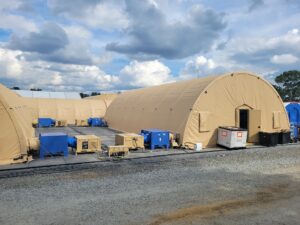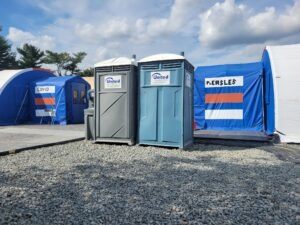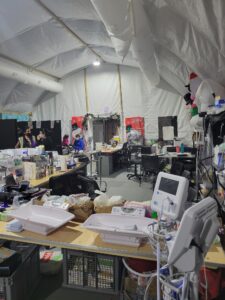PAs Help Afghan Evacuees Safely Join New Communities in the U.S.
Caryn Covella and Amy Keim Are Seizing an Opportunity To Make a Difference
August 24, 2022
By Dave Andrews
A stable job with a predictable schedule and a steady paycheck has its perks. So why would someone voluntarily step away from that level of job security and move thousands of miles away to take on an undefined role for an uncertain period of time?
A passion for service.

For several years, Caryn Covella, PA-C, MBA, had been working in San Antonio, Texas, as a PA in vascular surgery for the Department of Veterans Affairs (VA). But in late 2021, she learned there was a significant need for more providers to aid the United States’ efforts to help thousands of evacuees from Afghanistan. The influx of Afghans who fled their homeland was the result of the Taliban’s increasing influence in the region and its eventual takeover of Kabul.
“I’ve always been passionate about serving vulnerable populations,” Covella says. “And as I learned more about what was happening in Afghanistan and the countless evacuees who would need care, I quickly realized that this was an opportunity for me to help make a difference.”
A colleague of Covella’s put her in touch with administrators at Alleanza, one of the organizations affiliated with Operation Allies Welcome, a Department of Homeland Security program to help evacuees resettle in the United States. Covella expressed her interest in getting involved and was quickly invited to join a group of providers stationed at Joint Base McGuire-Dix-Lakehurst (Joint Base MDL) in New Jersey.

An estimated 14,000 Afghan evacuees had been brought to Joint Base MDL, which the U.S. Department of Defense set up as one of several “safe havens” where evacuees could be screened and vetted before resettling in the U.S. A large component of that effort involved performing medical evaluations and administering vaccines, in addition to providing the full range of care, including urgent care, reproductive care, pediatrics, psychiatric evaluation, chronic care management, and more.
Due to the nature of the program and the variety of roles available, the initial details Covella received from Alleanza about her assignment were vague. But despite the ambiguous job description, Covella was eager to start. Within just a few days, she had resigned from her job with the VA, packed up her car, and drove across the country to support the Afghan resettlement efforts.
Value of Versatility
When Covella arrived at Joint Base MDL, she and the other new providers met with the program director to discuss their work experience and identify which department they could best support. While many other providers’ areas of specialty were relatively narrow, Covella was able to draw upon her diverse PA skillset and ability to adapt to various duties.
“As PAs, we’re fundamentally general practitioners, which really opens up the possibilities for our scope of practice. Essentially, I could participate in any department,” Covella says. “They needed help in the pediatric wing, and even though it had been a while since I’d focused on pediatrics, I was excited to treat this population again and their unique medical needs.”

Covella continued to work primarily in pediatrics throughout her 12-week assignment at Joint Base MDL. And there was rarely a dull moment: An estimated 40% of the 14,000 guests were under the age of 14, and that number grew daily as more babies were born. And without high-tech diagnostic equipment, she said the medical team often had to “go back to the basics” to diagnose and treat patients.
Although Covella faced new challenges each day, she says the talented and diverse group of medical professionals with whom she worked could develop creative solutions for nearly any case or problem. The providers had to lean on each other’s prior experiences and expertise to treat whatever conditions the patients presented.
“With my surgical background, I was the first person they would call when a kid came in bleeding, broken, or with something that needed to be drained,” Covella says. “Our neonatologist was a major advocate for promoting safe sleeping conditions for the newborns. The mothers and babies would be discharged back to the base two days after delivery, and we had to figure out how to provide clothing, diapers, bottles, and formula.”

The guests lived in 1,000-person tents with a “bathroom trailer” outside. Simple tasks like making a warm bottle before bed, or even sanitizing the bottles, where challenges that required additional problem-solving efforts.
“The most humbling part of this experience was seeing how grateful the Afghan people were for any medical care we could provide, even with our limited resources,” Covella says. “Since many of the families had multiple children, we were able to build relationships with the families—thanks, in large part, to the interpreters we relied on throughout each visit. So it was always exciting to hear where they were going to be resettled and to wish them well as they started their new lives in America.”
Embracing Challenges
Working through unique logistical challenges with limited resources has almost become the norm for Amy Keim, PA-C, a PA in emergency medicine. In addition to serving as the director of clinical operations for Alleanza, Keim has also consulted on several similar programs in multiple different countries throughout her career.
In her role at Joint Base MDL, Keim was closely involved with nearly all clinical aspects of Alleanza’s clinical and procurement involvement: She helped determine formulary content, types of equipment procured, and evaluation of clinical personnel based on the projected needs of the population.
One of Keim’s more unique undertakings at Joint Base MDL was the design and construction of a new dental unit. Working with a modest budget, limited space, and myriad structural requirements, Keim knew she had to get creative. So she had a 43-foot semi-truck trailer outfitted as a three-chair, mobile dental clinic and had it deployed to the base.
“Diverse experiences like these are so rewarding, and they most definitely keep things interesting,” says Keim, who is also an associate clinical professor for the George Washington University School of Medicine and Health Sciences and director of acute traumatic wound care education for their Department of Emergency Medicine.

“I love the troubleshooting and logistics of looking at different populations to figure out their needs and how to best meet those needs,” she says. “What you can learn from these experiences is just amazing, especially in environments like this that are outside of the typical brick-and-mortar hospitals and clinics.”
Special Skillsets of PAs
According to Alleanza CEO Jim Marinucci, the need for providers in these types of programs continues to grow, especially the demand for PAs. Marinucci says he relies heavily on PAs within nearly all of Alleanza’s programs and in a variety of functions such as education, consulting, and clinical development.
“One of the central challenges has long been finding providers who can work in different capacities and under demanding circumstances,” Marinucci says. “However, in my experience working with countless PAs, they not only demonstrate a high clinical acumen, but they also excel in areas such as planning, logistics and education. There’s really almost no area that’s off limits to them.”
Keim and Covella—who are helping thousands of Afghans safely begin a new chapter of their lives—are prime examples of the versatility and acuity that define the PA profession.
“As we branch out and take on new opportunities, we grow as providers in our knowledge and skillset,” Keim says. “Ultimately, experiences like these expand the footprint of PAs in the medical community, and people develop a better understanding of our profession and the real difference we can make, both locally and internationally.”
Dave Andrews is a freelance writer and public relations professional based in Northern Virginia. Contact him at [email protected].
You May Also Like
PAs Deliver Healthcare to U.S. Asylum-Seeking Immigrant Families
PA’s Immigrant Parents Inspire His Career in Critical Care
Africa Calls PAs: Providing Medical Care on the Continent
Thank you for reading AAPA’s News Central
You have 2 articles left this month. Create a free account to read more stories, or become a member for more access to exclusive benefits! Already have an account? Log in.



